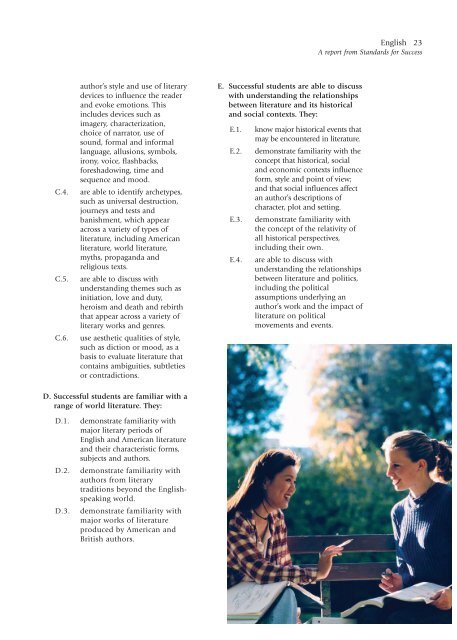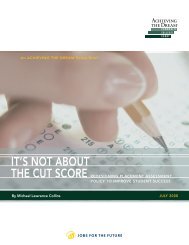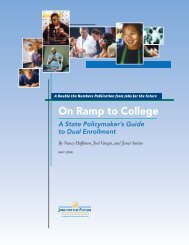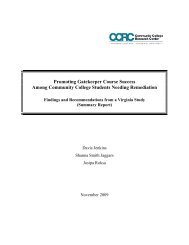Understanding University Success - Educational Policy ...
Understanding University Success - Educational Policy ...
Understanding University Success - Educational Policy ...
You also want an ePaper? Increase the reach of your titles
YUMPU automatically turns print PDFs into web optimized ePapers that Google loves.
English 23<br />
A report from Standards for <strong>Success</strong><br />
C.4.<br />
C.5.<br />
C.6.<br />
author’s style and use of literary<br />
devices to influence the reader<br />
and evoke emotions. This<br />
includes devices such as<br />
imagery, characterization,<br />
choice of narrator, use of<br />
sound, formal and informal<br />
language, allusions, symbols,<br />
irony, voice, flashbacks,<br />
foreshadowing, time and<br />
sequence and mood.<br />
are able to identify archetypes,<br />
such as universal destruction,<br />
journeys and tests and<br />
banishment, which appear<br />
across a variety of types of<br />
literature, including American<br />
literature, world literature,<br />
myths, propaganda and<br />
religious texts.<br />
are able to discuss with<br />
understanding themes such as<br />
initiation, love and duty,<br />
heroism and death and rebirth<br />
that appear across a variety of<br />
literary works and genres.<br />
use aesthetic qualities of style,<br />
such as diction or mood, as a<br />
basis to evaluate literature that<br />
contains ambiguities, subtleties<br />
or contradictions.<br />
E. <strong>Success</strong>ful students are able to discuss<br />
with understanding the relationships<br />
between literature and its historical<br />
and social contexts. They:<br />
E.1.<br />
E.2.<br />
E.3.<br />
E.4.<br />
know major historical events that<br />
may be encountered in literature.<br />
demonstrate familiarity with the<br />
concept that historical, social<br />
and economic contexts influence<br />
form, style and point of view;<br />
and that social influences affect<br />
an author’s descriptions of<br />
character, plot and setting.<br />
demonstrate familiarity with<br />
the concept of the relativity of<br />
all historical perspectives,<br />
including their own.<br />
are able to discuss with<br />
understanding the relationships<br />
between literature and politics,<br />
including the political<br />
assumptions underlying an<br />
author’s work and the impact of<br />
literature on political<br />
movements and events.<br />
D. <strong>Success</strong>ful students are familiar with a<br />
range of world literature. They:<br />
D.1.<br />
D.2.<br />
D.3.<br />
demonstrate familiarity with<br />
major literary periods of<br />
English and American literature<br />
and their characteristic forms,<br />
subjects and authors.<br />
demonstrate familiarity with<br />
authors from literary<br />
traditions beyond the Englishspeaking<br />
world.<br />
demonstrate familiarity with<br />
major works of literature<br />
produced by American and<br />
British authors.






